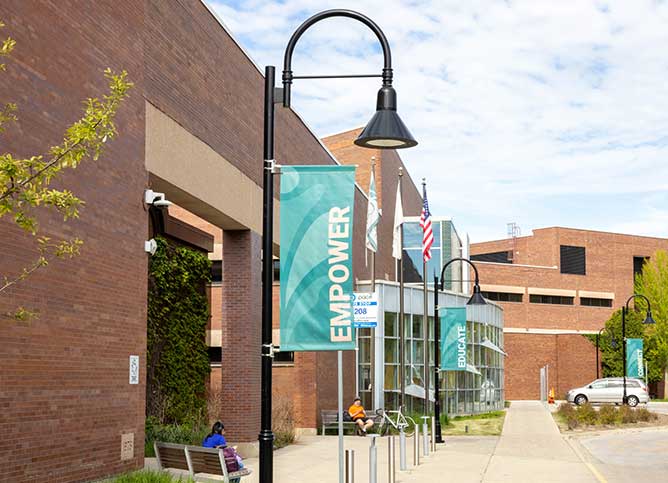Computer technology plays a tremendous role in life and business, and that role is only expanding every day. As this technology advances, so does the need for a highly trained, computer-savvy workforce. Developing computer knowledge and skills gives you a competitive edge, no matter your career field or area of interest. Oakton's Computer Applications for Business (CAB) curriculum offers the programs and courses you need to develop these essential skills.
The CAB program prepares you for all the application software commonly found in the modern workplace. You will become proficient with word processors, spreadsheets, databases, presentation graphics, business graphics and desktop publishing programs. In addition to making you a more efficient office problem solver, our program will also help you become a well-rounded office leader. You will develop supervisory skills, expand business productivity and enhance skills in communication, human relations and modern office technology systems and procedures.
Eligible CAB students can register for a business internship, which provides salaried employment experience in a computer-related environment where you can put your new skills to work right away.
Students who complete the program will receive an associate in applied science degree. Students can also seek professional certificates, including but not limited to the Microsoft Office Specialist, Operational Software Specialist, Executive Administrative and Creative Software User certificates.
The office systems technology field is highly sophisticated and demands a trained and competent workforce, and we want you to be at the forefront of that workforce. The training you receive at Oakton will prepare you to pursue a career as an administrative assistant, office manager, director of information support systems, office supervisor, marketing support representative, office support professional or office automation specialist.
We can help you with your career planning while you are still working on completing our Computer Applications for Business program. Get a head start on your career with our experts in the Career and Transfer Center.
Some of your classes may have minimum technology requirements. If you need help with computer access, you can reach out to the Information Technology Help Desk to request to borrow equipment or contact your professor prior to class.Enrolling at Oakton College can save you thousands of dollars and help you earn more over the course of your career. Our tuition is among the lowest in the region, and we offer many ways to bring your costs down even more.
99 percent of Oakton students graduate without debt.
To help you get there, you can apply for a scholarship, which you don’t have to pay back. We award $12 million in scholarships annually. Financial Aid includes grants, loans, and other forms of financial assistance that can reduce your costs of attending college.
We offer payment options that give you control over how you pay. Pay all at once or spread your payments over the course of the semester.
Learn more about your options for paying for your education

Oakton's Academic Catalog is your guide to programs, course descriptions and policies. You will find an overview of what classes are required for your certificate/degree, your pathway (or suggested sequence of classwork), along with learning outcomes.
Connecting with an advisor before you start the enrollment process can help you on your best path forward.
View the Course Catalog for the Computer Applications for Business A.A.S. Degree
Doris Gronseth
Coordinator
Distinguished Professor of Computer Technologies and Information Systems
B.A. Lewis University
M.B.A. Lewis University
M.A. Webster University
dgronset@oakton.edu
847.376.7055
Office: 2751, Des Plaines
Meet our part-time faculty
Floyd Aylin
Lecturer
A.A. College of San Mateo
B.S. San Jose State University
M.S. San Jose State University
faylin@oakton.edu
847.635.1910
Office: B206, Skokie
Cheryl Brown
Lecturer
B.S.B.A. University of Illinois, Chicago
M.B.A. Roosevelt Universtiy
cbrown@oakton.edu
847.635.1910
Office: B206, Skokie
Joanne Delaney
Lecturer
B.S. Mundelein College
M.S. DePaul University
J.D. DePaul University
jdelaney@oakton.edu
847.635.1910
Office: B206, Skokie
Renee Marks
Lecturer
B.J.S. Spertus College of Judaica
B.S.J. Northwestern University
J.M.A. Mundelein College
M.Ed. DePaul University
rmarks@oakton.edu
847.635.1910
Office: B206, Skokie
Russell McNeilly
Lecturer
B.S. Illinois Institute of Technology
M.B.A. Loyola University, Chicago
mcneill@oakton.edu
847.635.1910
Office: B206, Skokie
Marianne Millman
Lecturer
B.S. University of Illinois, Urbana-Champaign
M.B.A. DePaul University
mmillman@oakton.edu
847.635.1910
Office: B206, Skokie
Deanne Rehmer
Lecturer
B.S. Northern Illinois University
rehmer@oakton.edu
847.635.1910
Office: B206, Skokie
Joann Stavropoulos
Lecturer
A.A.S. Oakton College
B.S.Ed. DePaul University
M.A. DePaul University
joann@oakton.edu
847.635.1910
Office: B206, Skokie
W. Ken Woo
Lecturer
B.S. Loyola University
M.S. DePaul University
M.B.A. Lake Forest University
Ed.D. Benedictine University
kwoo@oakton.edu
847.635.1910
Office: B206, Skokie
The following courses are not offered every semester:
|
Fall
|
Spring
|
The CTIS Department--Computer Technology and Information Systems--is made up of two programs: CAB--Computer Applications for Business, and CIS--Computer Information Systems. The coordinator for each of these programs or the department chair can be contacted as indicated below:
Harold Ogg, chair of CTIS, coordinator of CSC
hcogg@oakton.edu or 847.376.7092
Michele Reznick, coordinator of CIS
mreznick@oakton.edu or 847.635.1904
Doris Gronseth, coordinator of CAB
dgronset@oakton.edu or 847.376.7055
The CAB program offers a variety of classes delivered through the World Wide Web. The Microsoft Office Specialist Core certificate as well as courses in all four main components of Microsoft Office--Word, Excel, PowerPoint, and Access can be learned in an online course environment. Visit the online courses link on this website for additional courses taught online in the CTIS Department. These credit courses can usually be adapted to the student's schedule and availability. The courses taught online often require a majority of class time be spent on the web, though most will require additional materials such as textbooks and/or video media. The courses contain a discussion forum and other online devices through which students can interact via the web with their teacher and classmates as well as a variety of other sources.
Online courses require different skills and learning styles from conventional courses. For instance, students in an online class are responsible for scheduling their own "class time." Motivation and self-discipline are essential for success in an online course. The online courses cover the same material as the on-campus sections of the same courses. The expected student requirements are the same whether the course is taken online or on campus. Visit Oakton's online learning site for more information.
With a good majority of communication taking place through the computer, keyboarding--being able to enter data without looking at your fingers and using both hands--is an essential skill. Do you want to be able to say all you want in an e-mail message and not have to cut it short because of the time it takes to find all the keys? Do you want to be able to concentrate on learning and/or using a software package without slowing yourself down looking for all of the necessary keys?
CAB 102 Basic Keyboarding is a one credit course that, in seven weeks, will teach you to keyboard without looking at your fingers. CAB104 Skill Building and Formatting is for the student that wants to further develop their keyboarding, document design, word processing, and communication skills. If you had a keyboarding course and wish to improve your speed or accuracy, consider CAB 106 Keyboarding Speed and Accuracy Development.